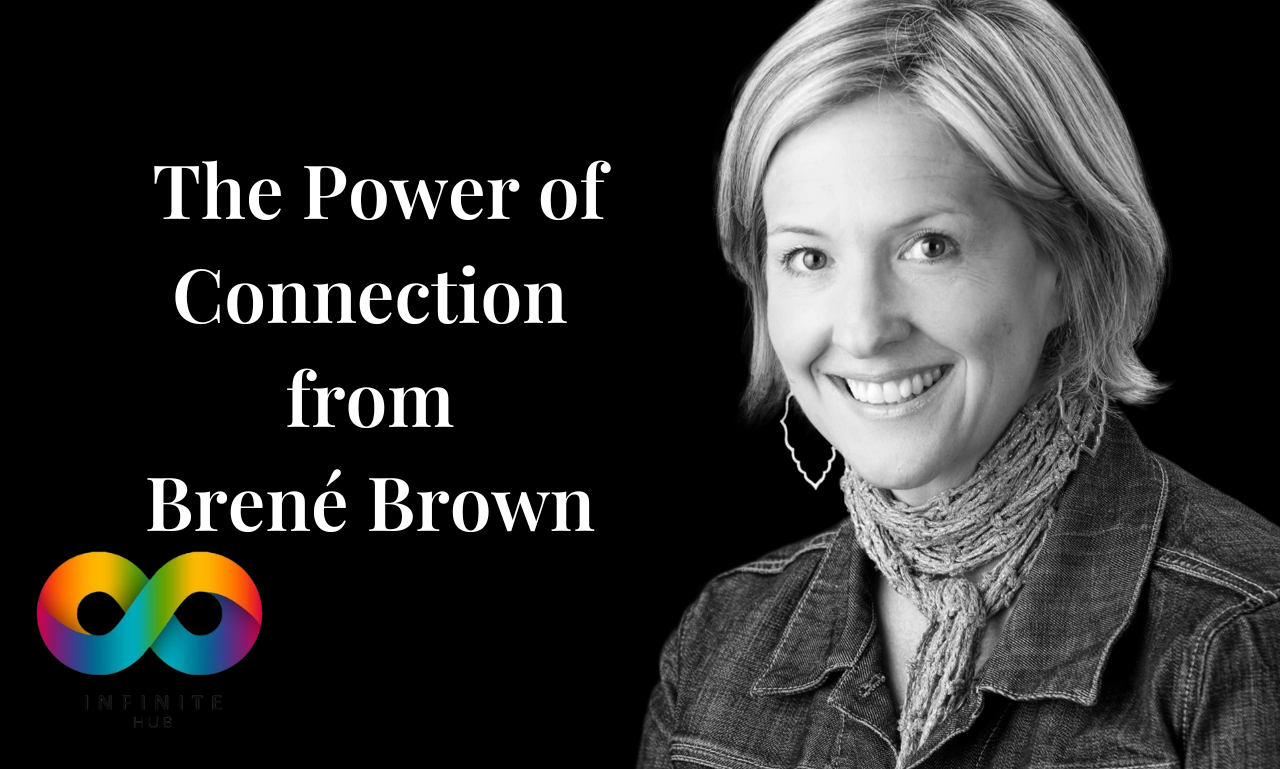Introduction
Brené Brown, a renowned researcher and storyteller, has dedicated her career to exploring the intricacies of human connection. Through her extensive research, she has shed light on the power of vulnerability, empathy, and authenticity in forging meaningful relationships. Brown’s work emphasizes that connection is a fundamental human need that profoundly impacts our lives.
The Concept of Connection
Definition and Importance
Connection is the energy that exists between people when they feel seen, heard, and valued. It’s the cornerstone of meaningful relationships and is crucial for emotional and mental well-being. Connection fosters a sense of belonging, reduces feelings of isolation, and enhances overall life satisfaction.
Brené Brown’s Approach to Connection
Brown’s Research Methodologies
Brené Brown’s approach to understanding connection involves qualitative research, particularly grounded theory. She conducts in-depth interviews and gathers narratives to uncover common themes related to vulnerability, shame, and empathy. Her methodologies are designed to capture the complexity of human emotions and experiences.
Vulnerability and Connection
How Vulnerability Fosters Connection
Vulnerability is at the heart of connection. Brown argues that allowing ourselves to be vulnerable—showing our true selves without fear of judgment—opens the door to genuine relationships. When we share our imperfections and struggles, we create opportunities for others to connect with us on a deeper level.
Shame and Connection
Understanding Shame and Its Impact on Relationships
Shame, the fear of disconnection, is a powerful emotion that can hinder our ability to connect with others. According to Brown, shame thrives in secrecy and silence. By addressing and sharing our shame, we can diminish its power and pave the way for more authentic connections.
Empathy and Connection
The Role of Empathy in Building Connections
Empathy involves understanding and sharing the feelings of another. Brown highlights empathy as a crucial element in forming connections, as it allows us to resonate with others’ experiences and emotions. Empathy fosters trust, reduces conflict, and enhances mutual understanding.
Authenticity in Connection
Importance of Being Authentic
Authenticity means embracing and expressing our true selves. Brown emphasizes that authenticity is essential for connection because it builds trust and fosters deeper, more meaningful relationships. When we are authentic, we invite others to do the same, creating a genuine bond.
Courage and Connection
How Courage Enhances Connections
Courage is the ability to face uncertainty, risk, and emotional exposure. Brown asserts that courage is necessary for connection, as it enables us to embrace vulnerability and take risks in relationships. Courage helps us initiate connections and maintain them despite challenges.
Belonging and Connection
The Need for Belonging in Human Experience
Belonging is an intrinsic human need. Brown’s research reveals that a sense of belonging enhances our well-being and resilience. When we feel connected to others, we experience a sense of security and support, which is vital for our overall health.
The Neuroscience of Connection
Brain Mechanisms Involved in Connection
Recent neuroscience research supports Brown’s findings, showing that connection activates the brain’s reward system. Neurotransmitters like oxytocin play a key role in bonding and social interactions, underscoring the biological basis for our need to connect.
Connection in Personal Relationships
Applying Brown’s Concepts to Family and Friends
Brown’s insights on vulnerability, empathy, and authenticity can transform personal relationships. By practicing these principles, we can deepen our connections with family and friends, leading to more fulfilling and supportive relationships.
Connection in Professional Settings
Building Connections at Work
Connection in the workplace fosters collaboration, innovation, and job satisfaction. Brown’s research suggests that when employees feel connected and valued, they are more engaged and productive. Implementing practices that promote vulnerability and empathy can enhance workplace culture.
Connection and Leadership
How Leaders Can Foster Connection
Effective leaders understand the importance of connection. Brown advocates for leadership that is grounded in vulnerability and empathy, which can inspire trust and loyalty among team members. Leaders who foster connection create environments where employees thrive.
Cultural Aspects of Connection
Impact of Culture on Connection Practices
Culture shapes how we perceive and practice connection. Brown’s work highlights the need to understand cultural differences in connection styles to foster inclusivity. Recognizing and respecting these differences can enhance our ability to connect across diverse groups.
Connection in the Digital Age
Challenges and Opportunities in the Digital World
The digital age presents unique challenges and opportunities for connection. While technology can facilitate connections across distances, it can also lead to superficial interactions. Brown emphasizes the importance of intentional and meaningful online connections.
Connection and Mental Health
Connection’s Role in Psychological Well-being
Strong connections are vital for mental health. Brown’s research shows that social connections can reduce stress, anxiety, and depression. Building and maintaining connections can provide emotional support and improve overall psychological well-being.
Barriers to Connection
Common Obstacles and How to Overcome Them
Several barriers can impede connection, including fear of vulnerability, shame, and lack of empathy. Brown offers strategies to overcome these obstacles, such as practicing self-compassion, seeking support, and actively working to build empathy.
Practicing Connection
Practical Tips and Exercises
Brown provides practical tips for enhancing connection, including active listening, expressing gratitude, and sharing personal stories. Exercises like vulnerability challenges and empathy practices can help individuals strengthen their connections.
Stories of Connection
Real-life Examples from Brown’s Research
Brown’s research is rich with stories that illustrate the power of connection. These narratives provide valuable insights into how individuals have transformed their lives by embracing vulnerability and fostering empathy.
The Ripple Effect of Connection
How Connection Impacts Broader Communities
The effects of connection extend beyond individual relationships. Brown’s work demonstrates how strong connections can create supportive communities, enhance social cohesion, and drive positive societal change.
Connection and Resilience
Building Resilience through Connection
Connection is a key component of resilience. Brown’s findings suggest that strong social networks provide emotional support and resources that help individuals bounce back from adversity. Building connections can enhance our ability to cope with challenges.
Educational Settings and Connection
Enhancing Connection in Schools and Universities
Educational institutions can play a pivotal role in fostering connection. Brown’s principles can be applied to create supportive learning environments that enhance student engagement, well-being, and academic success.
Connection in Social Movements
Role of Connection in Driving Social Change
Connection is fundamental to social movements. Brown’s research highlights how collective vulnerability and empathy can mobilize individuals and create powerful movements for change. Building connections can amplify efforts to address social issues.
Spirituality and Connection
Connection in the Spiritual Context
Spirituality often emphasizes the importance of connection. Brown’s work explores how spiritual practices can enhance our sense of connection to ourselves, others, and a higher power, contributing to a deeper sense of meaning and purpose.
Criticisms of Brown’s Work
Addressing Common Criticisms and Misunderstandings
While Brown’s work is widely acclaimed, it has also faced criticism. Common critiques include the applicability of her findings across different populations and the depth of her qualitative methodologies. Addressing these criticisms helps to refine and enhance her research.
Future Directions in Connection Research
Potential Areas for Further Study
The field of connection research continues to evolve. Brown identifies areas for future study, including the impact of technology on connection, the role of connection in diverse cultural contexts, and the biological mechanisms underlying connection.
Conclusion
Summary of Key Points
Brené Brown’s research underscores the profound impact of connection on our lives. By embracing vulnerability, empathy, and authenticity, we can build stronger, more meaningful relationships. Connection not only enhances our personal well-being but also fosters supportive communities and drives positive change.
FAQs
What is the main message of Brené Brown’s research on connection?
The main message is that vulnerability, empathy, and authenticity are essential for building meaningful connections that enhance our well-being and foster a sense of belonging.
How does vulnerability enhance connection?
Vulnerability allows us to show our true selves, fostering trust and deeper relationships. It opens the door to genuine connections by enabling us to share our imperfections and struggles.
What role does empathy play in building connections?
Empathy involves understanding and sharing the feelings of others, which fosters trust, reduces conflict, and enhances mutual understanding, making it a key element in forming connections.
How can we overcome barriers to connection?
Overcoming barriers to connection involves practicing self-compassion, seeking support, and actively working to build empathy. Addressing fears of vulnerability and shame can also help.
Why is connection important in the workplace?
Connection in the workplace fosters collaboration, innovation, and job satisfaction. Employees who feel connected and valued are more engaged and productive.
What are some practical tips for enhancing connection?
Practical tips include active listening, expressing gratitude, sharing personal stories, and engaging in vulnerability challenges and empathy practices to strengthen connections.
============================================



